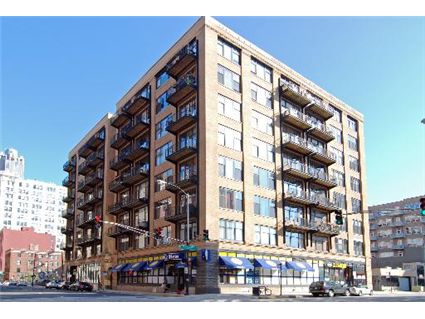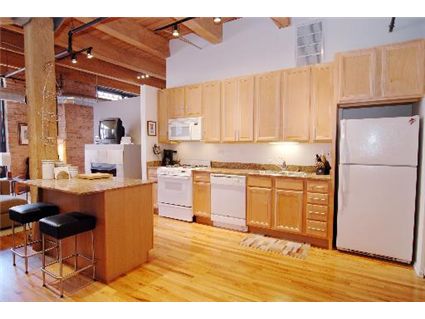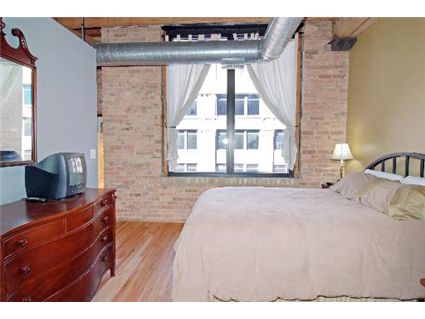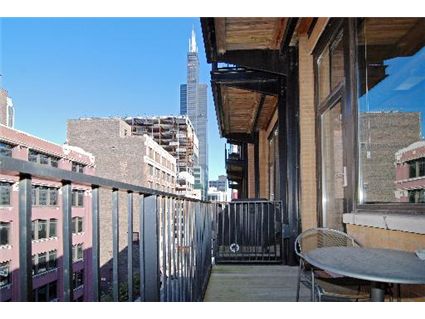We Love Authentic Lofts: Walk to Work for Under the 2006 Price: 625 W. Jackson
We’ve chattered about The Capitol Hill Lofts at 625 W. Jackson in the West Loop before.

It’s only a few blocks from the Sears Tower, most of downtown and Greektown.
This 2/2 loft has brick, timber and 14 foot ceilings as well as 2 balconies.
It’s also priced considerably less than the new construction building, 565 W. Quincy, that is clearly visible in the balcony picture about a block or two away. 565 W. Quincy starts closings shortly.
Is this a deal?



Sierra Bloom-Imwalle at Jameson Real Estate has the listing. See more pictures and a virtual tour here.
Unit #613: 2 bedrooms, 2 baths, no square footage listed
- Sold in September 2000 for $240,000
- Sold in January 2003 for $300,000
- Sold in July 2006 for $359,000
- Originally listed in November 2008 for $364,900
- Reduced several times
- Currently listed for $349,500 (parking included)
- Assessments of $435 a month
- Taxes are $3859
- Central air
- Two balconies
- Both bedrooms have windows
Not bad, but I’d sure like it better if the BR walls extended to the ceiling. Is there some logic to these incomplete walls or is it just a cheapout measure?
LOL a feature of what we all love “authentic lofts”…..
I don’t know if its a deal until the Sqft is revealed
” don’t know if its a deal until the Sqft is revealed”
Listed rooms total 728. So, prob somewhere around 1000, total.
What is this “Sears Tower” you mentioned?
Whatchu talkin bout… Willis, Tower?
“authentic lofts” so if anyone is cooking in your “loft” you get the smell of greasy bacon wafting over and permeating your bed and clothes.
Yeah…no thanks.
Its priced 100k too high: I would peg it at 300k but for the ridiculous taxes and assessments.
Still in a recession, under the 2006 price isnt going to cut it until its the 2000 price.
Even the 2000 price is a bit pricey. The buy, hold for three years then sell strategy only works when prices are appreciating. Imagine the sales history in reverse:
# Sold in September 2000 for $240,000
# Sold in January 2003 for $300,000
# Sold in July 2006 for $359,000
# Originally listed in November 2008 for $364,900
vs,
# Sold in November 2009 for $340,000
# Sold in July 2012 for $300,000
# Sold in January 2015 for $240,000
hd,
Scenario #2 is unlikely to happen if the government can prevent it. That is because unlike speculating in stocks, speculating in real estate is quintessentially American. Think Don Mclean, Apple Pie, Betty Crocker and RE speculation. Our policy makers have a vested interest in keeping real estate valuations out of line with rental yields. It is the ‘protected’ asset class.
I do love this part of town, everything you need is very conveinently located nearby. I was looking at a place in the halsted/adams area but it was a really tiny shoebox (like 750 sqft! 2/2) and they wanted like 330k for it. I passed.
Have seen several units in this building – bedrooms are all undersized and a lot of the living are layouts are pretty poor too. Balconys are very nice, though.
The condo I have now (that is a mirror image of this place) is mere blocks away from this unit….actually I can go to the roof top balcony and see the building. There are so many of these units in the West Loop that I honestly cannot see any type of appreciation for years to come, it at all.
Currently in my building (where not even half of these cookie cutter “authentic lofts” have sold in years) there are 9 units that were purchased with the sole intention of selling them in a few years for a profit.
I guarantee that none of these units will sell for much more than the original price. If you see one of these lofts, you have seen them all.
As much as I appreciate how far this area has come in way of regentrification, it has been done with little to no originality unit to unit, therefore there will be no appreciation on my unit or any others.
Is loosing money is RE the same as renting?
So if I sell my house for 20k less that I paid for it, and I lived there 5 years, is that a big deal? Is that the same as if I was just renting a place?
brad–yes and no. You can’t forget the money you lost paying interest on your mortgage, HOA fees or other fees you wouldn’t have paid if renting, etc. Add all those up, combine with the loss in principal on the residence, and that’s what it cost you to own verus renting over those 5 years.
If you had a large enough down payment, a low enough interest rate, and not to many repairs/taxes/other sunk costs, then it’s very possible you didn’t lose money compared to renting. But those are kind of big “ifs”–everyone’s situation will be different.
brad,
Remember you not only lose the 20k, you lose the incremental cost to you of owning vs renting as owning is more expensive currently. You need to compare it on a CF basis to calculate your total loss.
If owning was cheaper you would subtract this from the loss/add it to your gain. But ownings not cheaper in Chicago LOL. Too many idiots with too much leverage and too few math skills.
I like how people ignore that fact that if you bought a place, at the end of 30 years, you’d own it outright.
You may pay more month to month for expenses by owning, but at end of the mortgage, that’s far offset by the equity you’ve built plus appreciation.
Real estate was tailor made for long term wealth building and the government wants you to participate. That’s why the laws around real estate are so attractive (various tax deductions, depreciation expense, 1031 exchange, tax free capital gains, first time home owner programs, 0-25% deposits on loans, etc.)
Incorrect Madfly. When I compare renting vs. owning I strip out the equity payment as its essentially a transfer of wealth to myself (liquid to nonliquid though). At the beginning of a 30-year mortgage at 5% you’re only paying $120 back to yourself per 100k financed. Whats it over 5 years? 8.3k per 100k financed, actually. So even with brad’s example you’d still need to bring 12k to the table at closing to cover your loss, in addition to the incremental cost of owning over renting.
“but at end of the mortgage, that’s far offset by the equity you’ve built plus appreciation. “
err “in addition to the incremental cost of owning over renting. ” should’ve read “and overall you’d also be out “the incremental cost of owning over renting on top of this 12k”
I don’t understand why you’re stripping out the equity payment. What do you do with the market value of the home at the end of the mortgage term in your calculation – nothing?
To run the calculation, I would just do it from a cash flow perspective. Money paid out for 30 years, plus equity at the end, and compare them in a rent versus own scenario.
The question posed indicated a 5 year hold. That is nowhere near 30 years, and much, much closer to the average length of ownership.
You make your money in RE when you buy. If you bought this decade, and especially since 2002, you are going underwater (in nominal and real terms.) The depreciating value will only add to the monthly losses vs renting. Hold long enough and, sure, it might come back to make you a winner after your monthly losses (although not likely in real terms.) However, not buying in the bubble, and waiting out the decline, is the real winning strategy for “long term wealth building.”
“8.3k per 100k financed, actually. So even with brad’s example you’d still need to bring 12k to the table at closing ”
Hey, Bob, you really think brad bought a $100k property? If it was $250k, he’s slightly ahead after 5 years (using your numbers, w/o checking), with a $20k “loss”.
G- I asked in another thread but maybe you didn’t see it. What happened to your real estate investments (what kind of props, where did you buy, do you still own them, etc.)? Just curious.
5 years versus 30 years makes a difference – yes.
To compare renting vs. owning on a monthly basis in an apples vs. apples comparison you have to strip out the equity component in mortgage payments. At the end of the day housing is an expense. So to compare the expense associated with each option you would deduct the equity portion of your mortgage payment. Even after doing this in Chicago you’ll likely find in most cases it costs more to own than rent at the present period of time.
During the bubble this could be rationalized by the expectation of RE appreciation to meet or exceed this increased cost (and it did handily), but that is not the case anymore.
When you’re talking about a 30-year ownership horizon that is largely a guess very skewed by all kinds of economic variables I’d rather not try to predict. It has a lot to do with interest rates, rent price inflation, property taxes and capital expenditures on your home. It could very well be that post-ante owning was the better choice depending on when you bought and when you refinanced. Very few properties profiled on here have owners there for 30+, or even 10+ years though so I think my criticisms of rent vs buy are valid.
Is this a real 2 BR, or one of those faux/fraud 2 BRs where one of the bedrooms is really just a corner of the main living space offset with a slab of drywall that doesn’t go to the ceiling?
Not sure if this is one of those, but regardless…people need to knock that s*** off.
Month to month comparisons are simply not valid because the main benefit of owning is real estate is building equity and appreciation. For that, you need a longer time frame. Now if you want to use 10 years instead of 30, fine. But don’t do 30 days.
“if you want to use 10 years instead of 30, fine. But don’t do 30 days.”
So, I think most (all?) here would agree that it was (and now, again, it is really, really) dumb to buy with a 24 month ownership horizon, even if lots of people came out okay doing so–and they were really just lucky. And beyond that, there is some disagreement about the value of ownership as an investment, versus just someplace to live. Which disagreement is what makes the market.
Bob, we had this discussion with Steveo i.e. not counting equity payments in a rent v. own calculation. I’m of the opinion that in this market you should count the equity in the equation. you’re equity payment is not a transfer of wealth, it’s a toilet that you’re flushing your hard earned money down. That’s what being underwater is all about.
Madfly,
Appreciation is a gamble and not a given. If you go back awhile you’ll find that real estate depreciates, too.
As for building equity you can do that from taking the difference in cash flows between owning vs. renting and putting that in an FDIC insured account, or in a more stable market investment grade corporate or muni bonds.
Don’t forget maintenance and renovations over a 30 year period. My landlord takes care of that now. As a homeowner, I would be responsible for that. Think about it; $10k for a roof here; $1,000 for a garage door there; $1,500 for a sump pump installation, $50k for a new kitchen, $20k for a new bathroom…..A house is a depreciating asset that needs regular maintenance. in time the only thing worth any money is the land underneath the house.
OK – I did a quick calculation. Now you fuckers are making me build spreadsheets for entertainment, while at work.
Here’s the inputs:
Price: $200,000
Down: $40,000
Interest: 6%
Mortgage Payment: $1,000
Taxes + Association + Misc.: $600
Total ownership payment: $1,600
Time Horizon: 360 months
Total outflows (owner): $560,000
Down Payment opportunity cost (at 3% compounded annually): $57,000
Home value (at 3% appreciation compounded annually): $485,000
Net (owner): ($133,000)
Comparable Rent: $1,000
Net(renter): ($360,000)
Keep in mind, this assumes a conservative 3% appreciation on the home, which simply matches historical inflation AND it assumes no increase in rents, assessments or taxes for 30 years (if it did, ownership would look better).
MADFLY, as with anything, it all depends. If you are spending more collectively on interest, tax, assessments, maintenance, etc. than you would be spending on rent, then clearly you’d be better off renting and stashing your free cash elsewhere. You’re better off renting and saving until you can put enough down on a place to make those two figures even out, and only after that will buying make more financial sense. And even that somewhat assumes a healthy housing market.
You then have to model out over the next 10, 20, 30 years how your worth compares owning vs. renting and saving, with a variable for predicted long-term home value. Hooray for Excel.
MADFLY, nice rundown. Now, though…would you be up even MORE if you extended the rental period in order to save more for the down payment? I’m too lazy to check that against your model specifically, but that is the reality many are in in this market.
mikee, or hooray for the NYT rent-versus-own calculator, for those less ambitious. No, it isn’t perfect, but it’s as good a calculator as I’ve ever seen. Sabrina links to it on the right.
If you guys don’t like my spreadsheet, build you own.
I’m going home. 😉
What about the tax benefit of mortgage interest & property tax deductions? Also, the difference between the monthly payments of 1,600 buying and 1,000 renting could be invested in something?
MPS:
Assuming you qualify for it, the tax break can be modeled as follows: Taxbreak = (Marginal Tax Rate * Yearly Interest Expense) – (Marginal Tax Rate * Standard Deduction).
Its not so significant for lower priced homes (under 200k) as the standard deduction gets whacked. Its huge on higher priced homes and especially jumbo mortgages assuming they don’t hit AMT.
All I know is, any way I look at it, now is a rotten time to buy. I just don’t see the point.
MPS, good point about the tax benefits and invested monthly rental savings.
Shouldn’t MADFLY’S example look more like this?
Total outflows (owner, after est tax savings) (($1400 x 360)+40,000): $544,000
Down Payment opportunity cost (at 3% compounded annually): $57,000
Home value (at 3% appreciation compounded annually): $485,000
Net (owner): ($116,000)
Comparable Rent ($1,000 x 360): $360,000
$400 mo. rent savings invested (based on owner’s est after tax, at 3% appreciation compounded annually): $232,000
Net(renter): ($128,000)
Who wants to bet that the owner will not have repair expenses that far exceed the difference?
But you forgot the intrinsic value of saying you “own” something!
“Who wants to bet that the owner will not have repair expenses that far exceed the difference?”
Who wants to bet that rent never increases? This is turning into a repeat of many a pointless argument about this. Someone set up a google spreadsheet and then add every additional factor (can it be left open for collaboration?) someone comes up with, and we **might** get close.
Hey, I was just testimg MADFLY’s formula.
“Hey, I was just testimg MADFLY’s formula.”
And a true honest broker you were, sir.
I love how people come on cribchatter and just B*&tH about nothing. The whole point of this “we love authentic lofts” was to highlight that this unit in this building IS in fact, one of the only TRUE timber loft buildings left. It’s in fact, not cookie cutter, because it’s a split floor plan with windows in both bedrooms.
And, to assume that the seller is selling because they want to make some money after owning for only 2+ years is so ignorant. 9/10 sellers who bought in 2006 are NOT selling right now because they want to make money, but because they have to.
The whole point of a “loft” is that it isn’t supposed to have walls that go to the ceiling (for various rooms.) It’s supposed to be an open concept.
“True” lofts have no walls at all (except for the bathrooms.)
But since most Chicagoans can’t live like that- they put up these semi-walls (especially in the late 1990s era lofts.)
This unit has bedrooms with windows in both (unusual in most new construction today- sadly- even in the “non-loft” buildings.)
The 14-foot ceilings are also a nice feature. You rarely see ceilings that high anymore either.
People who want walls and “privacy” should NOT live in a loft. Loft living isn’t for them.
You also get regular security around this building thanks to the White Hen with all the police coming and going. CPD, ISP, occasional Cook County…
Thanks for getting this thread back on track…it seems lately every discussion turns into an economics lesson that we don’t need to hear as we are all aware of what is going on in the housing market now.
I was saying that out of the nearly 200 units in my building (almost exactly like this building) 9 are on the market now with inflated prices and owners who never lived in them at all.
Luckily I picked up a unit from the developer and did not have to deal with these hopeful ‘flippers’.
I do have everything this unit offers, 2 bdrms with windows, timber 14’+ ceilings and walls that do not hit the ceiling and NO interior doors whatsoever.
These units are/were HUGE in NYC for years and many are still going strong. I do not understand the fact that Chicagoans do not embrace this type of housing as it does have it’s benefits.
I do say “cookie cutter” as the West Loop is full of either full on lofts or the newer alternative “soft loft”….Amali 900 features these units for rent. There you have the choice of either a full finished unit or a soft loft with exposed ducts, concrete ceilings and partial walls. I think the developer there was under the impression that lofts were taking off in the city.
Regardless, if there is anyone who loves this type of city living, this IS a great unit, but I do have an issue with the price as I don’t think there is any justification for the price increase as there is really nothing that can be done to these places to ‘upgrade’ them to obtain that higher price. With the amount of available lofts in the W Loop and this inflated price, I think it will sit on market for some time.
“People who want walls and “privacy” should NOT live in a loft. Loft living isn’t for them.”
So why partition off bedrooms in loft spaces at all? Either don’t do it at all, or put up complete walls. A bedroom with no privacy makes no sense.
“It’s supposed to be an open concept”
What’s “open concept” about a permanent wall that ends short of the ceiling? The space is still divided, just in a half-assed way that accomplishes neither “open concept” or privacy.
JPS – Have you ever been in a true condo? One in NYC maybe? If so you can see why they are constructed the way they are and why people like living in them.
I do like them as I live alone…prob not for someone who has roomies or likes their privacy.
The thing that I really love about them is, in one place, I lived in a schoolhouse that had 14′ windows that lined one whole wall of the unit. By not having the walls go to the ceiling ( the ceiling was 22′ high for most of the unit – part of the gym) all of the rooms were able to receive light.
As was said earlier, true NYC artist’s lofts have no walls at all except for ones surrounding the bathrooms.
Either you love them or you hate them, but some are very cool!
Correction:
Should have read “Have you ever been in a true LOFT?
Yes I’ve been in “true lofts.” And I like them very much, if they are practical for living.
I just don’t see the point of half-walls in a loft residence that is intended to be occupied by more than one person, as opposed to an artist’s live/work space. The zillions of these conversions in Chicago are being marketed to a far wider audience than artists.
Yes, half walls do serve the function of bringing light into walled off rooms that lack windows. But that’s not an issue in this unit as both BR’s have windows.
The other “practicality” issue with converted brick/timber lofts is soundproofing. They have horrible interunit sound transmission issues if this isn’t addressed. Anybody know if this building has decent soundproofing?
Sabrina- you are not a loft expert…please do not lecture because you are misleading people.